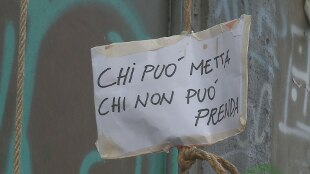Confindustria: the country at a crossroads between rise and decline.
Gualtieri: Confident, we will emerge from the crisis
Coronavirus, OECD: Worst crisis since the postwar period.
Italy's GDP -10.5% in 2020, + 5.4% in 2021
Confesercenti: "Consumption is not recovering. Since the start of the Covid crisis, 59.2 billion euros have been lost"
Share
October 10, 2020 A disturbing scenario emerges from the conference promoted in Rome by the National Anti-usury Council, regarding the socio-economic difficulties generated by the pandemic and in particular, the dramatic consequences for families.
The updated estimates of the Consulta, explains in his message the general secretary of the CEI, mgr.
Stefano Russo, "they speak of about 2 million over-indebted families and another 5 million just 'above the threshold', that is, in a precarious balance between disposable income and 'ordinary' debts".
Of these, "about 800 thousand people or 350 thousand families are in the usury area".
With realism, Russo denounces, it can be estimated that the shock of the pandemic has made the number of families in various degrees of suffering rise to at least 6 million: from those pressed by a state of financial or credit insolvency to those gradually more exposed to usury trap. "
at the risk even companies
" even companies are at risk of wear, especially the pandemic: 40,000 (as Confcommercio) may end up in the hands of organized crime ", underlines the number two of the CEI, for which the Foundations gathered in the National Anti-usury Council "are a wake-up call": "how many are already resorting to usurious loans that feed the mafia and corruption in the country?".
"We know that usury - notes Msgr.
Russian - is a phenomenon whose dimensions are not quantifiable due to the magnitude of supply and demand.
It is a phenomenon still submerged with very few complaints throughout Italy ". The problem, in short," is rather complex and requires a careful and aware awareness.
Above all by those who have responsibility to avoid that those in difficulty are forced to turn to unscrupulous usurers ".
Protecting weaker and more fragile subjects
In this context," can we imagine a choral, virtuous and effective reaction? ", He asks, remarking that "various subjects are already working in this direction, and we have confirmation of this from the commitment and dedication of health institutions, from the decisions taken by various political institutions, from the generous responses that come from educational realities, from many local administrations, from volunteers, from the same Christian communities that, generously, have taken steps to be close to those in need ". In moments like these", there is also the urgent need to protect with particular care the weakest and most fragile subjects, those who may already before the pandemic they experienced poverty, suffering, loneliness, marginalization, all situations that worsened with the advent of Covid ", adds Mgr. Russ
or.
Hence "the invitation to take actions that help overcome this phase without forcing the next generations to carry the burden of heavy debts, not only financial, accumulated in the current emergency".
Finally, hoping for the opportunity to "forge alliances and collaborative networks between institutions and organizations, committed to common goals", the CEI secretary sees positively how "for the future we can increasingly activate a fruitful collaboration" between anti-usury associations and local Caritas , "in the sign of that proximity, which often sees you in contact with the deep wounds of humanity of our time".

